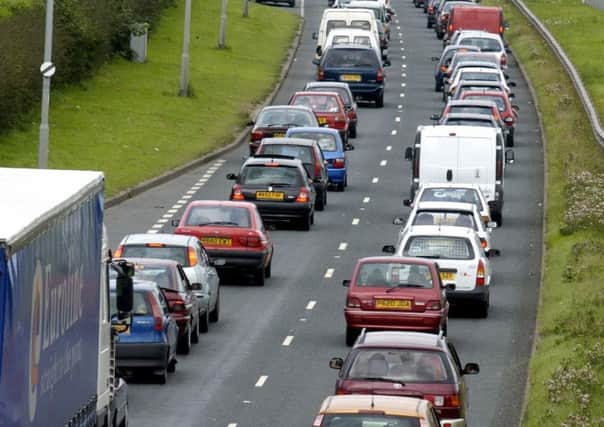Revealed: How long traffic jams will add to your journey in Nottinghamshire


Figures released by the Department for Transport reveal how many seconds drivers will spend at a standstill for every mile they travel on an A road.
The data for Nottinghamshire and in particular Nottingham city, shows that for every mile on one of the main roads across the area a car will be delayed by 83 seconds.
Advertisement
Hide AdAdvertisement
Hide AdSo for a daily commute of five miles a driver should add around seven minutes to the journey to get to work on time. Anyone travelling 20 miles can expect a delay of around 28 minutes.
The latest statistics, covering 2017, show there has been a rise of 6% on the previous year.
And Nottingham’s drivers are right if they get furious about traffic jams, as they are delayed more than the majority of England.
England overall has an average delay time of 47 seconds per mile.
Advertisement
Hide AdAdvertisement
Hide AdQueues can be caused by anything from fuel spills, emergency repairs and broken down lorries, to congestion during peak times.
And the figures show that traffic jams, one of Britain’s least popular national pastimes, are getting worse.
In 2015 delays in England were on average more than two seconds shorter.
All of this impacts speeds on A roads, where England’s average is 25mph despite speed limits ranging between 30mph to 70mph on anything from small urban roads to dual carriageways.
Advertisement
Hide AdAdvertisement
Hide AdIn 2017 motorists in Nottingham meandered along at 17mph on average.
This was slower than the previous year by 1%.
The DfT recently announced it was investing up to £10 million in Street Manager, a programme which will pass on up-to-date information about roadworks to sat-navs and navigation apps.
It will allow local authorities and utility companies to quickly notify users on road closures or delays, by updating Google Maps or Citymapper in real time.
Roads Minister, Jesse Norman, said: “Roadworks can often be frustrating for motorists, especially when they cause hold-ups at busy times and delay journeys.
Advertisement
Hide AdAdvertisement
Hide Ad“We want to reduce this disruption and delay, and Street Manager is just one of a number of actions we are taking so that local authorities and utility companies can better plan and manage their roadworks.
“The data opened up by this new digital service should enable motorists to plan their journeys better, so they can avoid works and get to their destinations more easily.”